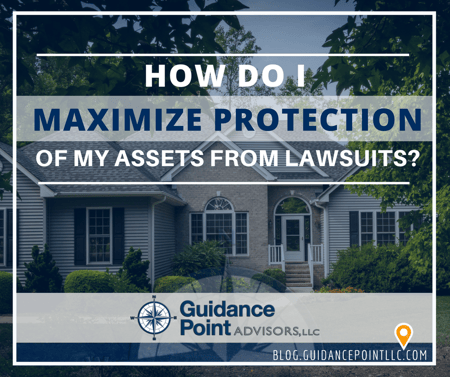In this litigious society, where it is not uncommon for citizens to sue each other over the most trivial of issues, people are rightly concerned with becoming the target of a lawsuit. This is especially true for those whose jobs place them in the contentious business world and workplace. So how do I maximize protection of my assets from lawsuits?

Some individuals who find themselves in this situation have come to accept the likelihood of being sued, and have taken steps to protect their assets well in advance. While certainly not exhaustive, the following list of questions generically discusses some common asset protection techniques that can be used as a point of reference for future discussions.
How is Your Home Titled?
Most states provide some kind of asset protection to the primary residence. The key may lie in how you titled your residence. One form of titling, "tenants by the entirety," is often a requirement to insulating home equity from claims of creditors.
Do You Own Cash Value Life Insurance or Annuities?
Life insurance and annuity cash values are other types of assets that are typically given some form of protection in most states. In some states like California, only a certain amount of cash value may be exempt, while others protect what appears to be unlimited amounts of cash value.
Do You Have a Qualified Retirement Plan?
In order to be tax-qualified in the eyes of the Internal Revenue Service (IRS), qualified plan assets must be "inalienable." Be careful however, since not all plans receive a blanket exemption. Most notable are Individual Retirement Accounts (IRAs), which in some states are reachable by your creditors.
Do You Have a Trust Fund?
In some cases, a "spendthrift" clause in a trust will prevent creditors from attacking trust fund assets. However, this protection almost never applies in the case of so-called "self-settled" trusts. In other words, you cannot typically set up a trust for your own advantage unless you give up all control and benefits. However, it may be possible to establish such a trust to benefit selected family members.
What About Foreign Trusts?
Trusts set up in other countries can be an effective planning technique. However, these trusts may be expensive to establish and maintain, and recent legislation has further complicated an already complex issue. Despite their cost and the tax law governing them, these trusts may, in some instances, help protect your assets from the claims of your creditors.
What’s the Bottom Line? Get Expert Help.
Plain and simple, asset protection planning is complex and requires the assistance of expert tax and legal counsel.
Also, if you are considering hiring a new financial advisor, download our FREE Financial Advisor Interview Checklist! Be sure that your advisor is the right fit for you and your needs.
If you enjoyed this blog, you will also enjoy these!
Top 5 Problems With Financial Advisors and How to Solve Them
Should I Pay Off the Mortgage or Invest for Retirement?
What Happens at a Financial Planning Meeting?


